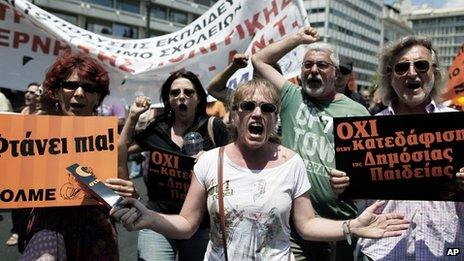Europe's debt crisis simmers
- Published
- comments

Athens: Teachers are angry about cuts - as are their public sector colleagues
To visit Rome is to be reminded of just how fragile the current calm in the eurozone is.
This morning the construction industry held its annual conference. Construction accounts for 15% of Italy's GDP. One company owner said the industry was facing its gravest crisis since World War II: 11,000 companies have collapsed, with a loss of 690,000 jobs.
There are also new threats to the governing coalition. Silvio Berlusconi - whose party is in the coalition - is fighting to avoid a ruling by the Supreme Court at the end of the month that could see him barred from public office. He maintains the legal case against him (he was convicted of tax fraud) is politically motivated. Yesterday his party disrupted proceedings in parliament in protest.
One senator said openly that if the court ruled against Berlusconi the party would leave the government, possibly triggering fresh elections. One Italian paper said the coalition was hanging by a thread.
Only this week a credit ratings agency downgraded Italy to two levels above junk status.
'Ready to revolt'
In Greece the coalition will struggle to get through parliament the new measures which will enable the next tranche of bailout money to be paid. The laws have to be passed by next week.
Nearly a dozen coalition MPs are raising objections to the deal, particularly the moves to reduce public sector staff by 12,500. A general strike has been called for next week. Police officers have been protesting and occupying offices over the loss of jobs.
Today the Greek unemployment rate went up to 26.9%. Between 700 and 1,000 people are laid off each day. I was struck by a comment made by someone who has been unemployed for two years. "Things are really terrible, terrible. We are all ready to revolt. We are on the edge. There is hunger everywhere." No one knows whether such despair will be reflected on the streets.
It is accepted that Greece has a funding gap of 4bn euros (£3.4bn; $5bn) over the next 12 months. That might require further belt-tightening. Almost certainly Greek debt will have to be, once again, restructured. At some stage German taxpayers will have to be told the truth - some of the money they loaned towards the Greek bailout will not be repaid.
Southern malaise
In Spain, Prime Minister Mariano Rajoy is facing a fresh round of allegations that he accepted illegal payments. He denies the reports, but the corruption scandal is deepening.
In Portugal the president has called on the three main parties to agree a "national salvation pact" around the current reform/austerity programme. But the political consensus has weakened. Many now say that the Brussels/Berlin strategy - with its emphasis on deficit reduction - is leading to stagnation. There are increasing doubts that next year Portugal will be able to return to the markets to fund itself.
In Cyprus, the economy has slumped badly after the bailout and very little progress has been made in restructuring the Bank of Cyprus.
Southern Europe is struggling, hoping against hope that in the final quarter of this year growth will return. It remains clear, however, that much can still disturb the superficial calm in Europe.